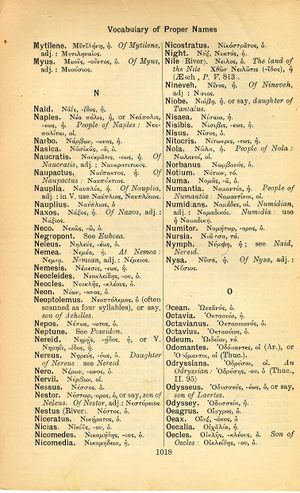Nessus
Περὶ τοῦ ἐπέκεινα τοῦ νοῦ κατὰ μὲν νόησιν πολλὰ λέγεται, θεωρεῖται δὲ ἀνοησίᾳ κρείττονι νοήσεως → On the subject of that which is beyond intellect, many statements are made on the basis of intellection, but it may be immediately cognised only by means of a non-intellection superior to intellection
English > Greek (Woodhouse)
Νέσσος, ὁ.
Latin > English (Lewis & Short)
Nessus: i, m., = Νέσσος.
I A river in Thrace, now the Mesto or (Turkish) Karasu, Liv. 45, 29, 6; also called Nestos ( = Νέστος), Mel. 2, 2.—
II A Centaur, who, on offering violence to Dejanira, was slain by Hercules with a poisoned arrow, Ov. M. 9, 101 sq.; Hyg. Fab. 34.—Hence,
III Nessēus, a, um, adj., of Nessus: venenum, with the blood of Nessus, poisoned by the arrow of Hercules, Ov. H. 9, 163: palla tabe Nesseā illita, Sen. Herc. Oet. 716.
Latin > French (Gaffiot 2016)
Nessus,¹² ī, m. (Νέσσος), centaure tué par Hercule : Ov. M. 9, 101 ; Hyg. Fab. 34 || rivière de Thrace : Liv. 45, 29, 6.
Latin > German (Georges)
Nessus, ī, m. (Νέσσος), I) ein Fluß in Thracien, der auf dem Gebirge Rhodope entspringt u. in das Ägäische Meer fällt, j. Mesto, bei den Türken Karasu, Liv. 45, 29, 6. – urspr. Nestos (Νέστος) gen., Mela 2, 2, 2 u. 9 (2. § 17 u. 30). – II) ein Zentaur in Ätolien, der von Herkules, als er die Deïanira entführen wollte, getötet wurde, aber sterbend der Deïanira das mit seinem giftigen Blute getränkte Gewand als Liebesmittel gab (s. Herculēs), Ov. met. 9, 101. Hyg. fab. 34. – Dav. Nessēus, a, um (Νέσσειος), nessëisch, des Nessus, venenum, Ov.: tabes, Sen. poët.

